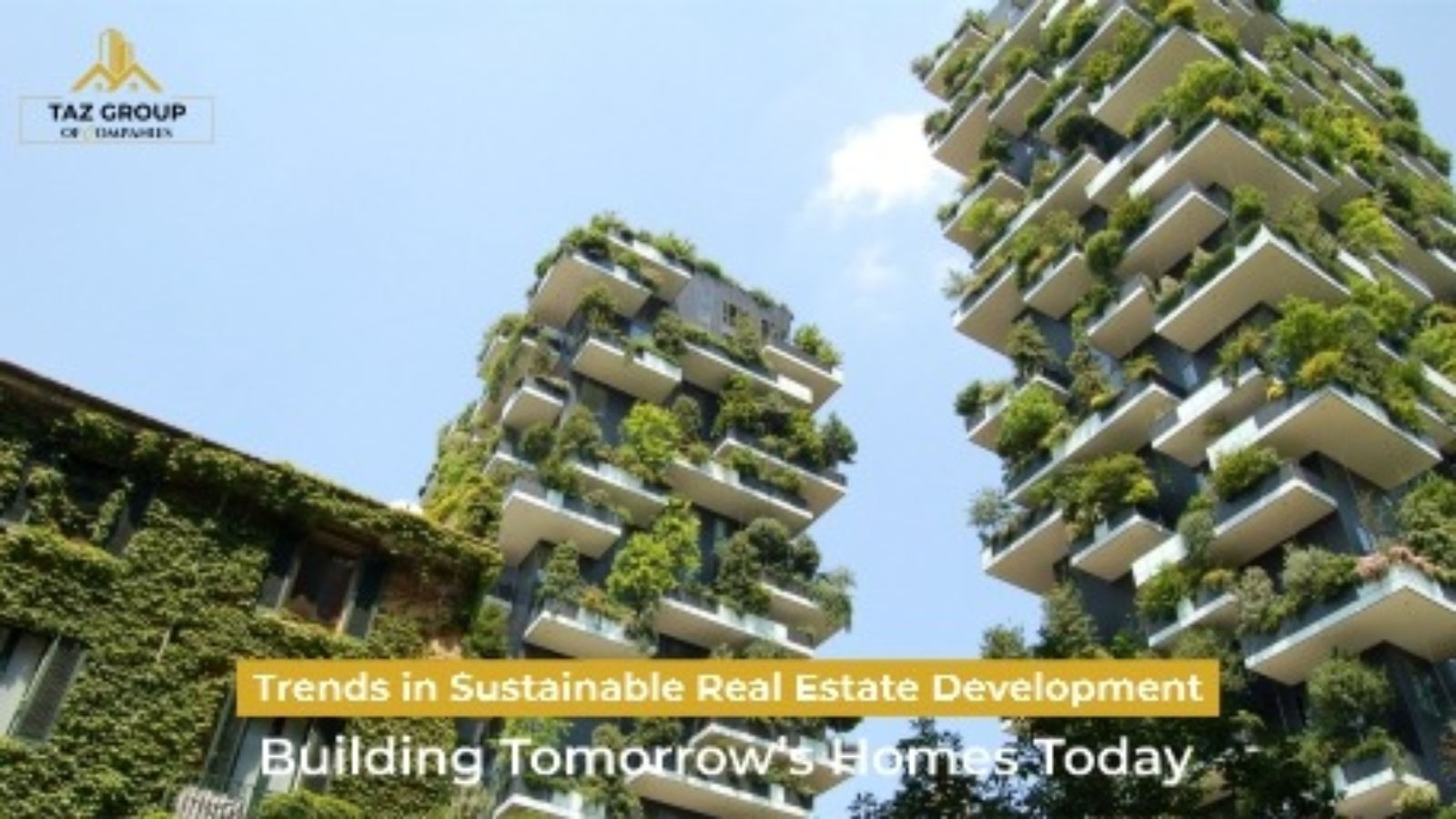Introduction.
In the ever-evolving landscape of real estate development, sustainability has become a driving force shaping the industry’s future. As we witness a global shift towards eco-conscious living, sustainable real estate development is no longer just a trend; it’s a necessity. In this article, we’ll explore the latest trends in sustainable real estate development, highlighting innovations, challenges, and the promising future it holds.
1. Green Building Materials.
A Paradigm Shift in Construction.
The use of eco-friendly building materials is gaining traction, providing sustainable alternatives to traditional construction methods. From recycled steel to bamboo, developers are embracing materials that reduce environmental impact without compromising structural integrity.
2. Energy-Efficient Technologies.
Powering the Future Responsibly.
Incorporating cutting-edge technologies, such as solar panels, smart grids, and energy-efficient HVAC systems, sustainable developments aim to minimize energy consumption. This not only benefits the environment but also reduces utility costs for homeowners.
3. Sustainable Urban Planning.
Creating Eco-Friendly Communities.
Cities are reimagining urban planning, focusing on walkability, green spaces, and mixed-use developments. By prioritizing sustainable transportation options and green infrastructure, these communities aim to enhance residents’ quality of life while minimizing their ecological footprint.
4. Net-Zero Carbon Emissions.
Balancing the Carbon Equation.
The race to achieve net-zero carbon emissions is a defining trend in sustainable real estate. Developers are implementing innovative designs and technologies to offset carbon footprints, creating buildings that produce as much clean energy as they consume.
5. Adaptive Reuse and Renovation.
Breathing New Life into Old Spaces.
Sustainable development extends beyond new constructions. Adaptive reuse and renovation of existing structures help reduce waste and preserve the historical fabric of communities. Converting old warehouses into energy-efficient lofts or repurposing industrial spaces aligns with the ethos of sustainability.
6. Smart Home Integration.
The Rise of Intelligent Living.
Technology and sustainability converge in the realm of smart homes. Sustainable real estate developments incorporate smart home features that optimize energy use, enhance security, and provide residents with greater control over their living spaces.
7. Water Conservation Strategies.
A Precious Resource Preserved.
Water scarcity is a growing concern globally, prompting sustainable real estate developers to implement water-saving technologies. From efficient irrigation systems to greywater recycling, these strategies contribute to responsible water usage.
8. Certification and Standards.
Upholding Sustainable Practices.
Certifications like LEED (Leadership in Energy and Environmental Design) are becoming prerequisites for sustainable real estate projects. Meeting these standards ensures that developments adhere to environmentally conscious practices, giving consumers confidence in their eco-friendly choices.
9. Community Engagement.
Empowering Residents for a Greener Tomorrow.
Sustainable real estate development goes beyond the physical structures. Developers are actively engaging communities, fostering a sense of environmental responsibility. Community gardens, educational programs, and eco-friendly initiatives create a collective commitment to sustainability.
10. Circular Economy Principles.
Reducing, Reusing, and Recycling.
Embracing the principles of a circular economy, sustainable real estate development minimizes waste by prioritizing the reuse and recycling of materials. This approach contributes to a more sustainable and resilient built environment.
11. Resilient Design for Climate Change.
Future-Proofing Against Climate Challenges.
As climate change impacts become more pronounced, sustainable real estate developers are adopting resilient design principles. This involves creating structures that can withstand and adapt to changing climate conditions, ensuring longevity and durability.
12. Financial Incentives for Sustainability.
Investing in a Greener Future.
Governments and financial institutions are offering incentives for sustainable real estate development. From tax breaks to favorable financing terms, these incentives encourage developers to prioritize environmentally friendly practices.
13. Corporate Social Responsibility in Real Estate.
Beyond Profit: Making a Positive Impact.
Real estate developers are increasingly recognizing their role in society. Corporate social responsibility (CSR) initiatives, such as affordable housing projects and community outreach programs, demonstrate a commitment to creating positive social and environmental impacts.
14. The Rise of Eco Districts.
Holistic Approaches to Sustainable Living.
Eco districts are emerging as comprehensive models of sustainable urban development. These integrated neighborhoods prioritize environmental, social, and economic sustainability, creating harmonious and balanced living environments.
15. AI and Data Analytics in Sustainable Development.
Precision Planning for a Sustainable Future.
Artificial intelligence and data analytics play a pivotal role in optimizing sustainable real estate development. From predicting energy usage patterns to enhancing resource allocation, these technologies enable precise planning and decision-making.
Conclusion.
In the dynamic landscape of real estate development, the trends in sustainable practices are reshaping the industry. From embracing green building materials to fostering community engagement and integrating advanced technologies, sustainable real estate development is a multifaceted endeavor. As we move towards a more eco-conscious future, these trends not only reflect the current state of the industry but also pave the way for a sustainable tomorrow.
FAQs about Sustainable Real Estate Development.
Q1: What are the key benefits of sustainable real estate development for homeowners?
Sustainable real estate development offers homeowners reduced utility costs, a smaller environmental footprint, and the satisfaction of contributing to a greener future.
Q2: How do certifications like LEED contribute to sustainable real estate development?
Certifications like LEED ensure that real estate projects adhere to environmentally conscious practices, providing consumers with confidence in their eco-friendly choices.
Q3: What role does community engagement play in sustainable real estate development?
Community engagement fosters a sense of environmental responsibility among residents, creating a collective commitment to sustainability beyond the physical structures.
Q4: How can AI and data analytics contribute to sustainable real estate development?
AI and data analytics enable precise planning and decision-making in sustainable real estate development, optimizing resource allocation and predicting energy usage patterns.
Q5: Are there financial incentives for developers involved in sustainable real estate projects?
Yes, governments and financial institutions often offer incentives such as tax breaks and favorable financing terms to encourage developers to prioritize environmentally friendly practices.

